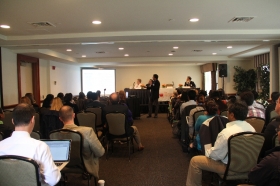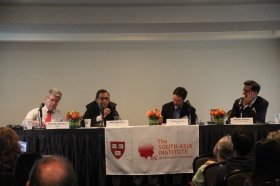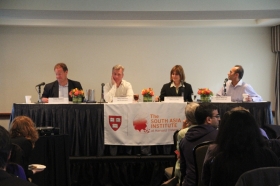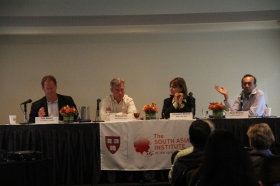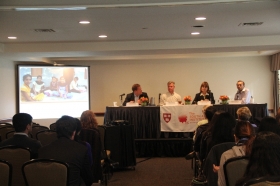 On May 8, the South Asia Institute at Harvard University (SAI) and the Central Square Foundation (CSF) convened a group of high-level stakeholders for a roundtable discussion to shape and commit on the agenda for forging linkages between education reformers in the US and in India focused on improving learning outcomes for children. The program was part of a multi-year effort to strengthen the linkages between education reformers in both the US, India and other countries working to improve educational outcomes at a systemic level. Entrepreneurs who are working at the community level, private philanthropists funding innovation and research and the academics performing this research met to establish a framework for learning and building innovative structures. A central tension in our discussions was: how to achieve excellent learning outcomes at a level of scale that impacts millions of children; how do we balance “excellence” with the pressing need “to scale”?
On May 8, the South Asia Institute at Harvard University (SAI) and the Central Square Foundation (CSF) convened a group of high-level stakeholders for a roundtable discussion to shape and commit on the agenda for forging linkages between education reformers in the US and in India focused on improving learning outcomes for children. The program was part of a multi-year effort to strengthen the linkages between education reformers in both the US, India and other countries working to improve educational outcomes at a systemic level. Entrepreneurs who are working at the community level, private philanthropists funding innovation and research and the academics performing this research met to establish a framework for learning and building innovative structures. A central tension in our discussions was: how to achieve excellent learning outcomes at a level of scale that impacts millions of children; how do we balance “excellence” with the pressing need “to scale”?
An Overview of India’s Educational Landscape
Overview – Karthik Murlidharan, Assistant Professor of Economics at University of California, San Diego
India’s educational system is failing its children, and the implications for economic development are significant. In the past ten years Government of India spending on education has grown and the results are discouraging; while enrollment levels have improved, students’ learning outcomes are dismal. What are the structural changes that might improve learning in both the public sponsored schools and the private sector ones? How do we frame and sequence the social investment to accomplish this?
What Do We Know and What Do We Need to Know?
Moderator – Fernando Reimers, Ford Foundation Professor of International Education and Director of Global Education and of International Education Policy at the Harvard Graduate School of Education
Panel: Abhijit Banerjee, MIT, Abdul Latif Jamal Poverty Action Lab; Ashish Dhawan, CEO and Founder, Central Square Foundation and Felipe Barrera-Osorio, Assistant Professor of Education and Economics, Harvard Graduate School of Education
What evidence do we have, and what evidence do we need to generate to inform the design and content of this social investment strategy. Educators in India have worked on many levels and across many frontiers to promote improved learning outcomes. Non – profit service providers and philanthropic groups have developed a myriad of interventions; what works and what doesn’t? Looking ahead, where do we need to place our investments to generate the insights and findings that will influence policy makers? Are there important lessons from outside of India that can be applied?
What Are the Critical Questions We Can Discern from the US Education Reform Movement?
Moderator – Tarun Khanna, Director, South Asia Institute, Jorge Paulo Lemann Professor, Harvard Business School
Panel: Tom Haslett, Central Square Foundation; Stig Leschly, CEO, Match Education; Jacqueline Bhabha, Executive Director Harvard University Committee on Human Rights Studies
The education reform movements outside of India have taken different directions and each offers some insight to efforts in India. The US offers many such important lessons for the emerging education reform movement in India. As we consider the past 20 years here in the US, can we apply “lessons learned” to the Indian context? What are the critical questions that we should pursue?:
What is more important “excellence” or “scale” in program? What is the best application of philanthropic capital: research, pilot stage intervention or scaling programs with promise? How do you support advocacy efforts? If you could restart education reform in the US with 20 years of perspective, what would you do differently?



